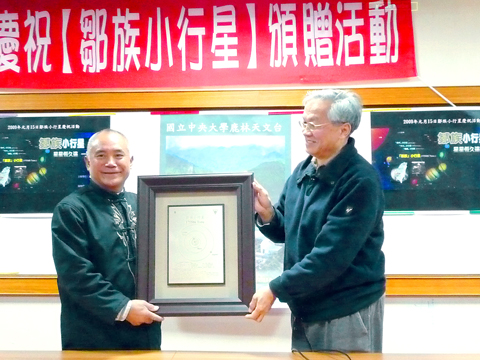An asteroid that was discovered by astronomers working together from both sides of the Taiwan Strait in 2006 and named after the Aboriginal Tsou tribe has been recognized by the International Astronomical Union (IAU), an academic source said on Thursday.
An IAU commission in charge of naming comets and minor planets recognized the newly discovered asteroid as “175586 = Tsou = 2006 TU106” on Dec. 12 last year, making it the first asteroid to be named after an indigenous Taiwanese tribe, said Yeh Yung-heng (葉永烜), vice president of National Central University (NCU) in Chongli.
Asteroid Tsou was first discovered at NCU’s Lulin Observatory on Oct. 15, 2006, through joint efforts by Ye Quanzhi (葉泉志), of Sun Yat-sen University in Guangzhou, China, and Lin Chi-sheng (林啟生), of the NCU Graduate Institute of Astronomy.

PHOTO: CHEN HSUAN-YU, TAIPEI TIMES
Ye first planned a photographic chart to allow Lin and his research team at the Lulin Observatory — which sits on a mountaintop at the border between Nantou and Chiayi counties — to acquire images using the observatory’s 41cm camera.
Ye then analyzed the findings before referring them to the IAU for confirmation.
Lin said asteroid Tsou was located in the orbit of minor planets, asteroids and comets between Mars and Jupiter.
It cannot be seen with the naked eye because it is too far away and too dim, Lin said.
A ceremony was held at NCU on Thursday in which a model of asteroid Tsou was presented to the Alishan rural township in recognition for the contributions made by the Tsou tribe in building the observatory.
Yeh said the establishment of the Lulin Observatory would have been impossible if not for the assistance of the Aboriginal people living in the area.
Yeh, who is also a professor at NCU Graduate Institute of Astronomy, said Taiwan’s indigenous people have a rich knowledge of astronomy that has been handed down orally from generation to generation, adding that people from the Tsou and Bunun tribes carried brick and cement on their backs up to the mountaintop — which is 2,862m above sea level — to build the observatory.
In addition, four Tsou men have been employed as 24-hour guards at the observatory, all year round, since the observatory was built in 1999, Yeh said.
The IAU’s recognition of asteroid Tsou came after publicity was generated by Comet Lulin — the first comet discovered by Ye and Lin in 2007 — at the beginning of this year.
Astronomers advised star gazers to make use of the upcoming Lunar New Year holiday to take a look at the comet, which would be visible low in the east-southeast portion of the sky before dawn.

NUMBERS IMBALANCE: More than 4 million Taiwanese have visited China this year, while only about half a million Chinese have visited here Beijing has yet to respond to Taiwan’s requests for negotiation over matters related to the recovery of cross-strait tourism, the Tourism Administration said yesterday. Taiwan’s tourism authority issued the statement after Chinese-language daily the China Times reported yesterday that the government’s policy of banning group tours to China does not stop Taiwanese from visiting the country. As of October, more than 4.2 million had traveled to China this year, exceeding last year. Beijing estimated the number of Taiwanese tourists in China could reach 4.5 million this year. By contrast, only 500,000 Chinese tourists are expected in Taiwan, the report said. The report

Temperatures are forecast to drop steadily as a continental cold air mass moves across Taiwan, with some areas also likely to see heavy rainfall, the Central Weather Administration (CWA) said. From today through early tomorrow, a cold air mass would keep temperatures low across central and northern Taiwan, and the eastern half of Taiwan proper, with isolated brief showers forecast along Keelung’s north coast, Taipei and New Taipei City’s mountainous areas and eastern Taiwan, it said. Lows of 11°C to 15°C are forecast in central and northern Taiwan, Yilan County, and the outlying Kinmen and Lienchiang (Matsu) counties, and 14°C to 17°C

SHIPS, TRAINS AND AUTOMOBILES: The ministry has announced changes to varied transportation industries taking effect soon, with a number of effects for passengers Beginning next month, the post office is canceling signature upon delivery and written inquiry services for international registered small packets in accordance with the new policy of the Universal Postal Union, the Ministry of Transportation and Communications said yesterday. The new policy does not apply to packets that are to be delivered to China, the ministry said. Senders of international registered small packets would receive a NT$10 rebate on postage if the packets are sent from Jan. 1 to March 31, it added. The ministry said that three other policies are also scheduled to take effect next month. International cruise ship operators

STEERING FAILURE: The first boat of its class is experiencing teething issues as it readies for acceptance by the navy, according to a recent story about rudder failure The Hai Kun (海鯤), the nation’s first locally built submarine, allegedly suffered a total failure of stern hydraulic systems during the second round of sea acceptance trials on June 26, and sailors were forced to manually operate the X-rudder to turn the submarine and return to port, news Web site Mirror Daily reported yesterday. The report said that tugboats following the Hai Kun assisted the submarine in avoiding collisions with other ships due to the X-rudder malfunctioning. At the time of the report, the submarine had completed its trials and was scheduled to begin diving and surfacing tests in shallow areas. The X-rudder,